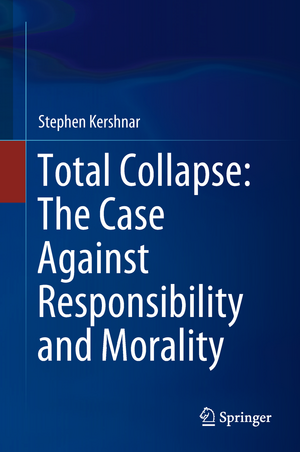Total Collapse: The Case Against Responsibility and Morality
Autor Stephen Kershnaren Limba Engleză Hardback – 16 apr 2018
| Toate formatele și edițiile | Preț | Express |
|---|---|---|
| Paperback (1) | 579.67 lei 43-57 zile | |
| Springer International Publishing – 10 ian 2019 | 579.67 lei 43-57 zile | |
| Hardback (1) | 642.18 lei 43-57 zile | |
| Springer International Publishing – 16 apr 2018 | 642.18 lei 43-57 zile |
Preț: 642.18 lei
Preț vechi: 755.51 lei
-15% Nou
Puncte Express: 963
Preț estimativ în valută:
122.92€ • 133.56$ • 103.32£
122.92€ • 133.56$ • 103.32£
Carte tipărită la comandă
Livrare economică 21 aprilie-05 mai
Preluare comenzi: 021 569.72.76
Specificații
ISBN-13: 9783319769493
ISBN-10: 3319769499
Pagini: 213
Ilustrații: XIII, 193 p.
Dimensiuni: 155 x 235 mm
Greutate: 0.47 kg
Ediția:1st ed. 2018
Editura: Springer International Publishing
Colecția Springer
Locul publicării:Cham, Switzerland
ISBN-10: 3319769499
Pagini: 213
Ilustrații: XIII, 193 p.
Dimensiuni: 155 x 235 mm
Greutate: 0.47 kg
Ediția:1st ed. 2018
Editura: Springer International Publishing
Colecția Springer
Locul publicării:Cham, Switzerland
Cuprins
1 Introduction.- Part I; No Non-Consequentialist Morality.- 2 How Consent Works.- 3 Problems with Forfeiture.- 4 Against Proportionality: Proportionality is Not a Side-Constraint on Punishment.- 5 Rights Fail and Why This Explains the Other Failures.- Part II; Why There is no non-consequentialist morality.- 6 No responsibility (Responsibility and Foundationalism).- 7 If There Were Responsibility, It Wouldn’t Do Much Work (Responsibility and Internalism).- 8 No Responsibility No Morality.- 9 Responsibility Revisionists and Skeptics.- 10 Appendix One: What is Moral Responsibility?.- 11 Appendix Two: God is Not Morally Responsible.
Notă biografică
Stephen Kershnar is a distinguished teaching professor in the philosophy department at the State University of New York at Fredonia and an attorney. He focuses on applied ethics and political philosophy. Kershnar has written over eighty articles and book chapters on such diverse topics as torture, affirmative action, reparations for slavery, pornography, hell, adult-child sex, discrimination, the most valuable player, capitalism, equal opportunity, slavery, sexual fantasies, and the nature of pleasure. He is the author of eight books, including Does the Pro-Life Worldview Make Sense? Abortion, Hell, and Violence Against Abortion Doctors (Routledge: New York, 2018), Adult-Child Sex: A Philosophical Defense (2015), Gratitude toward Veterans: A Philosophical Explanation of Why Americans Should Not Be Very Grateful to Veterans (2014), and For Torture: A Right-Based Defense (2012).
Textul de pe ultima copertă
This book argues that there is no morality and that people are not morally responsible for what they do. In particular, it argues that what people do is neither right nor wrong and that they are neither praiseworthy nor blameworthy for doing it. Morality and moral responsibility lie at the heart of how we view the world. In our daily life, we feel that people act rightly or wrongly, make the world better or worse, and are virtuous or vicious. These policies are central to our justifying how we see the world and treat others. In this book, the author argues that our views on these matters are false. He presents a series of arguments that threaten to undermine our theoretical and practical worldviews. The philosophical costs of denying moral responsibility and morality are enormous. It does violence to philosophical positions that many people took a lifetime to develop. Worse, it does violence to our everyday view of people. A host of concepts that we rely on daily (praiseworthy, blameworthy, desert, virtue, right, wrong, good, bad, etc.) fail to refer to any property in the world and are thus deeply mistaken. This book is of interest to philosophers, lawyers, and humanities professors as well as people interested in morality, law, religion, and public policy.
Caracteristici
The first book to deny that people are morally responsible and that morality exists and to connect these two claims Relates moral responsibility to foundationalism, internalism, and rights Tightly organized, concise, and accessible
